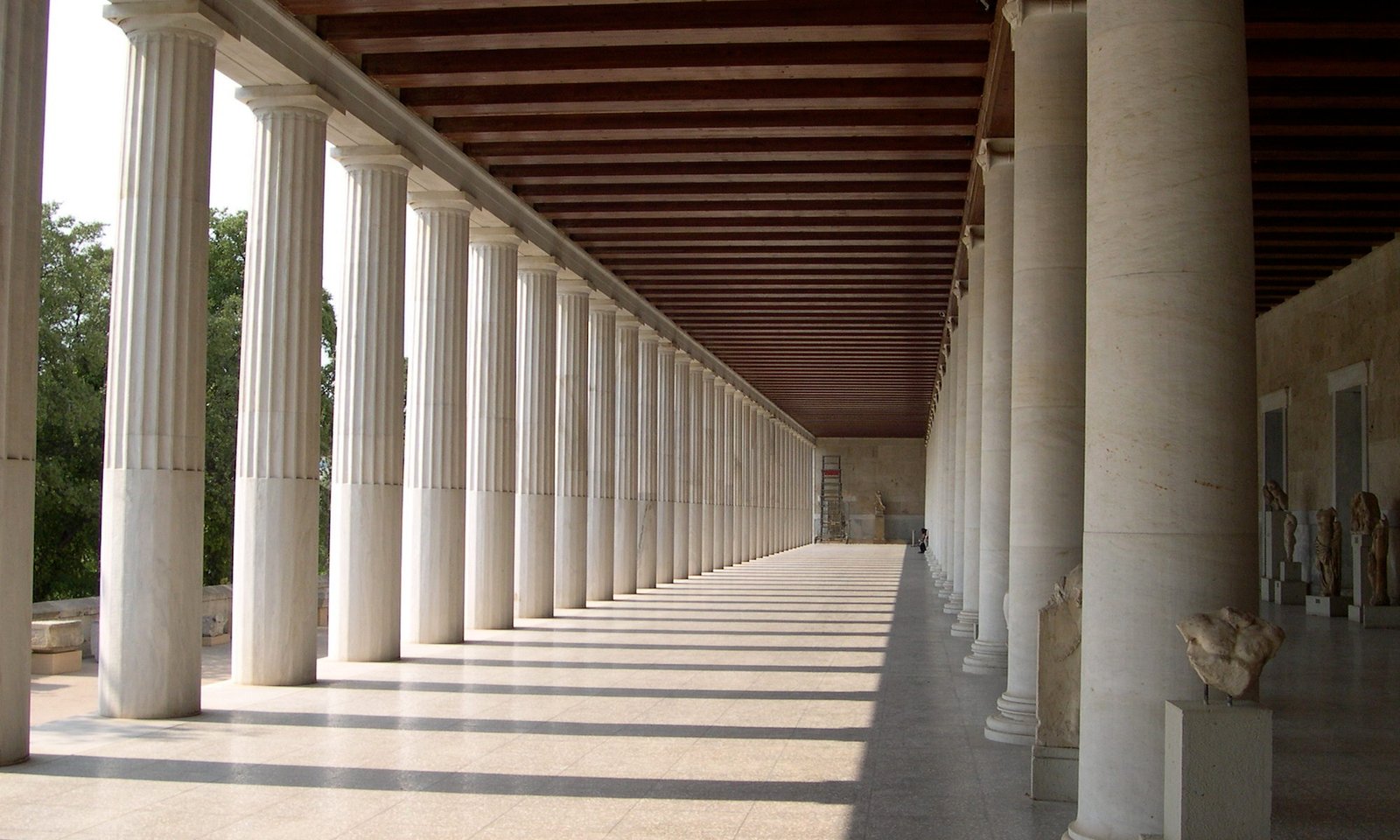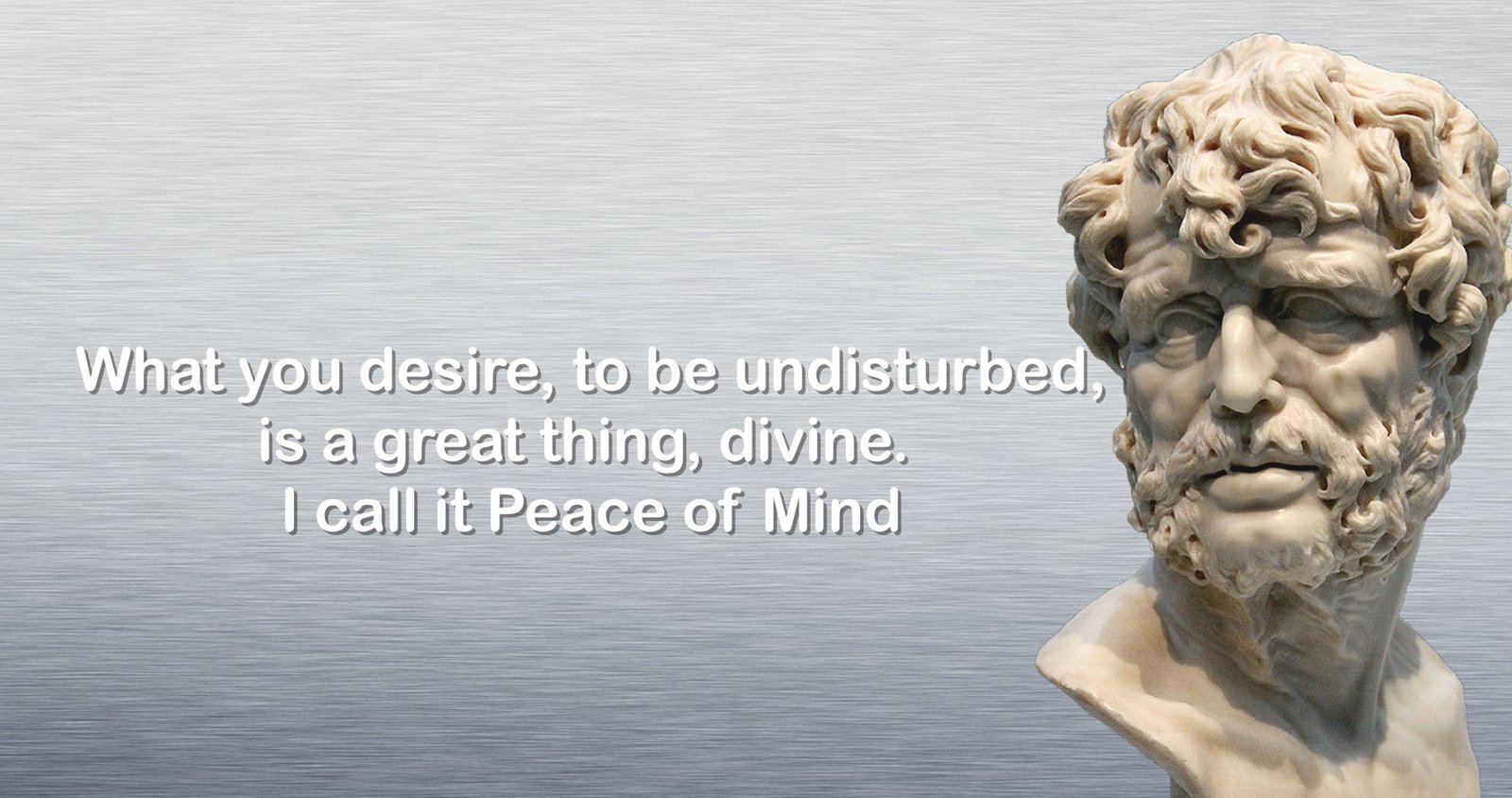The essay “Of Peace of Mind“ was written as a means of guidance for all those who wish to dedicate themselves to moral improvement. Seneca presents the stoic doctrine’s response to help us overcome the torments caused by human fears and desires and achieve tranquility, the ideal state of serenity experienced fully and permanently by the ideal stoic sage.
Seneca’s philosophical lecture is used not as a strictly intellectual activity, but as a means to stimulate in the readers an inner disposition that can result in the practice of positive conducts in line with the stoic doctrine, of which Seneca was an important proponent.
Of Peace of Mind begins with a letter from Annaeus Serenus to his friend Seneca, asking for advice and saying that he feels he has a good command over some of his vices but not over others, and as a result his soul has no tranquility. He says “I am neither ill nor well“ and realizes that his judgment on his own affairs is distorted by personal prejudices. “I am well aware that these oscillations of mind are not perilous and that they threaten me with no serious disorder: to express what I complain of by an exact simile, I am not suffering from a storm, but from sea-sickness. Take from me, then, this evil, whatever it may be, and help one who is in distress within sight of land“ (I, 17).
Serenus lists his problems: doubt in the face of the desire for goods and physical pleasures (§5-9); alternation between the desire for social action and recollection into studies (§10-12) and an ethical and aesthetic dilemma concerning the search for fame (§13-14). After presenting the symptoms, making use of the patient’s image before the doctor, Serenus asks for the diagnosis and remedy: “I beg you, therefore, if you have any remedy by which you could stop this vacillation of mine, to deem me worthy to owe my peace of mind to you“.
Seneca’s response takes the remaining chapters and begins with a full description of the characteristics of the disease. He informs Serenus that he seeks the most important thing in life, a state that he calls Peace of Mind (tranquillitas) and that the Greeks called euthymia (II,3). He then explains that there are several kinds of men who do not achieve peace of mind, for different reasons. Some suffer from inconstancy, continually changing their goals and yet always lamenting of what they have just given up. Others are not erratic, but are in an unhappy position because of their torpidity. They “go on living not in the way they wish, but in the way they have begun to live“, that is, by inertia (II,6). Still others believe that the way to overcome their inconstancy is to journey far away, but of course they carry only their own problems with them: “Thus every mortal from himself doth flee“ (II,14). Seneca concludes his preamble by suggesting that our problems do not reside in the place where we live, but in ourselves, and rhetorically asks: “How long are we to go on doing the same thing?“ (II, 15)
From Chapter III, Seneca presents a series of specific advice for Serenus on how to achieve peace of mind. The first comes from Athenodorus: “is to occupy oneself with business, with the management of affairs of state and the duties of a citizen“. This is because to be at the service of others and one’s own country is, at the same time, to exercise oneself in an activity and to do good. But one can also do good and keep oneself occupied by engaging in philosophy. This kind of occupation will provide satisfaction and therefore peace of mind and will make our lives different from those of others who will have nothing to show for their own at the end of their lives: “Often a man who is very old in years has nothing beyond his age by which he can prove that he has lived a long time“. It then follows with precepts about activities and idleness (negotia × otium).
In chapters VI and VII Seneca elucidates how to evaluate oneself and thus to choose a path where success is possible. It begins by warning his friend that it is common for people to think they can achieve more than they really can. The wise person, instead, is aware of his or her limitations. We must also remember that some pursuits are simply not worth the effort and we must move away from them because our time in life is short and precious. And so, says Seneca, “apply yourself to something which you can finish, or at any rate can hope to finish” (VI, 4). We must also be careful in choosing our associates, dedicating portions of our lives to people worth the effort. In addition, our quests should be of the kind we really like, if possible: “for no good is done by forcing one’s mind to engage in uncongenial work: it is vain to struggle against Nature.“ (VII,2)
Chapters VIII and IX deal with precepts about wealth, “the most fertile source of human sorrow“ (VIII, 1). Seneca warns Annaeus Serenus that, in his experience, the rich cannot bear losses better than the poor, for “that it hurts bald men as much as hairy men to have their hairs pulled out“ (VIII, 3). That is why Diogenes was not the owner of anything, to make it impossible for any one to take from him: “Fortune, mind your own business: Diogenes has nothing left that belongs to you“ (VIII:7). Of course, Seneca himself was no Diogenes, and in fact he was a very rich man. He was often accusated and charged with being hypocritical because of this, but his point is that one should not be attached to material goods. It is possible to have possessions, as long as you are not possessed by your wealth. Yet in the same section he advises to reduce the quantity of our possessions in order to reduce the probability of clinging to them in an exaggerated manner: “We never can so thoroughly defeat the vast diversity and malignity of misfortune with which we are threatened as not to feel the weight of many gusts if we offer a large spread of canvas to the wind“ (IX,3).
In the sequence, chapters X and XI, the vicissitudes of fortune are addressed, beginning with the good and traditional stoic suggestion on how to adjust to new situations. If you have lost something, even something precious, because of the changes of the winds of Fortune, just remember that “In every station of life you will find amusements, relaxations, and enjoyments; that is, provided you be willing to make light of evils rather than to hate them.“ (X,1). To this, classical quotes follow that are jewels of wisdom that require no addition: “When [the wise man] is bidden to give [property] up, he will not complain of Fortune, but will say, ‘I thank you for what I have had possession of: I have managed your property so as largely to increase it, but since you order me, I give it back to you and return it willingly and thankfully.’“ (XI, 2). “What hardship can there be in returning to the place from whence one came? A man cannot live well if he knows not how to die well.“ (XI, 4). And: “Disease, captivity, disaster, conflagration, are none of them unexpected: I always knew with what disorderly company Nature had associated me.” (XI,7).
In chapters XII and XIII the sources of restlessness arising from personal circumstances are addressed, bearing in mind the hardships of Fortune: false desires concerning goods and honors, public and private activities. Seneca warns his friend of the danger of occupying himself just to do something, instead of making good choices about how to use his time. He envisions a brief dialogue with those who do not know what they are doing or why: “By Hercules, I do not know: but I shall see some people and do something.“ We probably know people like that: things haven’t changed that much in two thousand years. It follows that we accept fate for what it is, and we actually try to do the best with the new circumstances. Seneca recalls the example of Zeno - the founder of the Stoic School - who lost everything in a shipwreck and began to study philosophy - saying: “Fortune bids me follow philosophy in lighter marching order“ (XIV, 3).
But of course Seneca understands that sometimes life is a tragedy, as when good people (he mentions Socrates, Rutilius, Pompey, Cicero and Cato) are treated with injustice. Even so, valuable lessons can be learned: “See how each of them endured his fate, and if they endured it bravely, long in your heart for courage as great as theirs … All these men discovered how at the cost of a small portion of time they might obtain immortality, and by their deaths gained eternal life.“ (XVI, 2-4).
In the the epilogue, Seneca affirms that the soul of men must have a rest, we must mix loneliness with social contact, work with leisure and enjoy games, amusements and drinks, but all with moderation: “We must not force crops from rich fields, for an unbroken course of heavy crops will soon exhaust their fertility, and so also the liveliness of our minds will be destroyed by unceasing labour, but they will recover their strength after a short period of rest and relief: for continuous toil produces a sort of numbness and sluggishness.“
This last section overturns the unjustified accusation that the stoics would be spoil-joys, by recommending that we play with children like Socrates, dance like Scipio, walk outdoors and drink like Cato and Solon. “sometimes we gain strength by driving in a carriage, by travel, by change of air, or by social meals and a more generous allowance of wine: at times we ought to drink even to intoxication, not so as to drown, but merely to dip ourselves in wine: for wine washes away troubles and dislodges them from the depths of the mind, and acts as a remedy to sorrow as it does to some diseases.“ (XVII, 8).
It is not known when the dialogue Of Peace of Mind was written. It may have been composed and published in the period from the early 1950s until around 62 or 63.
Annaeus Serenus is the recipient not only of the book Of Peace of Mind, but also of On the Firmness of the Wise Person and of On the Leisure. He was a great friend of Seneca, a member of the equestrian order, formed by the wealthiest citizens. Serenus was also in charge of public administration, having obtained, under the influence of Seneca, the function of praefectus, responsible for fighting fires, an important activity in the city of Rome. He was quite young and died prematurely, according to Seneca in one of his letters to Lucillius. (Letters from a Stoic)

